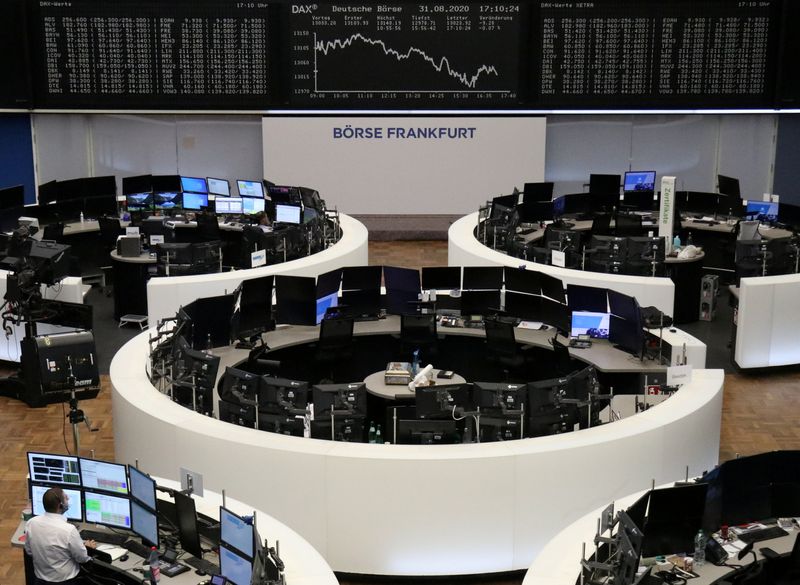NEW YORK (Reuters) – Global equity benchmarks slipped and U.S. government bonds rallied on Thursday as a rebound in U.S. technology stocks stalled after the European Central Bank left its stimulus program unchanged and a stimulus bill failed in the U.S. Senate.
MSCI’s gauge of stocks across the globe <.MIWD00000PUS> shed 1.06% following modest declines in Europe and gains in Asia.
On Wall Street, the Dow Jones Industrial Average <.DJI> fell 406.02 points, or 1.45%, to 27,534.45, the S&P 500 <.SPX> lost 60 points, or 1.77%, to 3,338.96 and the Nasdaq Composite <.IXIC> dropped 221.97 points, or 1.99%, to 10,919.59.
The ECB’s decision not to ramp up its stimulus program bolstered the euro, which has gained more than 8% against the dollar since the spring and more than 4% against a basket of currencies weighted by the bloc’s foreign trade.
The dollar index <=USD> rose 0.159%, with the euro <EUR=> up 0.1% to $1.1814.
Economists said the ECB will likely have to take more action to support its economy, possibly in December.
“But by resisting calls to cut interest rates deeper into negative territory, the bank has consolidated the appeal of the euro to global investors. It is now walking a tightrope of currency appreciation, as it dare not let the euro rise too high for fear of hampering the recovery of export-dependent economies like Germany,” said Ulas Akincilar, head of trading at the online broker Infinox.
In the United States, initial claims for state unemployment benefits came in slightly higher than expectations and totaled a seasonally adjusted 884,000 for the week ended Sept. 5. That matched the number of applications received in the prior week as layoffs and furloughs persisted across industries.
The U.S. Senate on Thursday killed a Republican bill that would have provided around $300 billion in new coronavirus aid, as Democrats seeking far more funding prevented it from advancing. The failure of the measure left the future of any additional coronavirus aid before the November presidential election in doubt.
Mizuho Bank’s head of economics and strategy in Singapore, Vishnu Varathan, said investors were grappling with whether this month’s steep U.S. tech sell-off was finished, and beyond that an increasingly uncertain U.S. political outlook and persistent Sino-U.S. tensions.
“It’s too soon to say whether the rout is over, or whether last night’s recovery is simply a pause,” ANZ analysts said in a note on Thursday, referring to Wednesday’s equity rebound.
In a sign of the unsettled day in markets, safe-haven assets such as U.S. government bonds reversed course and rallied into the U.S. close.
Benchmark 10-year notes <US10YT=RR> last rose 6/32 in price to yield 0.6837%, from 0.703% late on Wednesday.
Concerns about demand for fuel also put oil prices under pressure, an indication of wavering confidence in global growth. [O/R]
U.S. crude <CLc1> recently fell 2.37% to $37.15 per barrel and Brent <LCOc1> was at $39.79, down 2.45% on the day.
(Reporting by David Randall; Editing by Will Dunham, Steve Orlofsky, Dan Grebler and Cynthia Osterman)





















